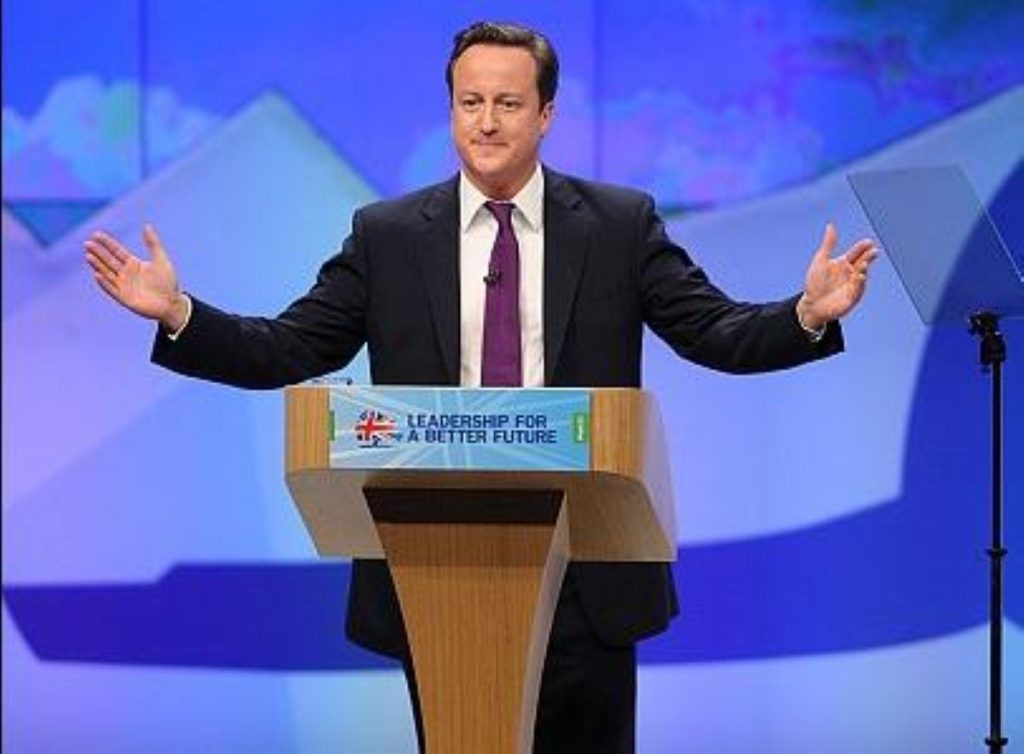Conference speech sketch: Centre-ground Cameron’s theatre of deception
It sounded right-wing, so the Tory party fell about in adoration of their leader. Didn't they notice his speech was all about retaking the centre?
By Alex Stevenson in Manchester Follow @alex__stevenson
They queue for hours, they shuffle in, they are talked at. They applaud, dazzled by the bright lights and the stage-managed rhetoric. Then they leave. This, it seems, is modern politics.
"It's a bit like Stalin lecturing the party congress, isn't it?" one elderly gent waiting outside the conference hall observed cheerily. He'd been a Conservative for years, but this was his first time at party conference. He wasn't impressed. Like many others I'd spoken to in Manchester this week, he was fed up that his party's autumn conference is so carefully choreographed it has all the political value of a Regency quadrille.


Not wanting to see anyone downcast, I tried to cheer him up by pointing out he was about to attend the only part of conference when choreographing will always be acceptable: the leader's speech. This great occasion is the spinners' supreme moment, when the leader has both the attention of the country and a hopelessly pliable audience, desperate to applaud or offer standing ovations at any opportunity.
The Conservative party was not in the mood for a small-scale affair this year. The vast auditorium was full up with chairs, regimentally arranged in huge blocks which somehow seemed more formal than in previous years. They had evidently got a bit carried away, for there were actually six or seven rows of empty seats at the back of the hall. This must have been one of the prime minister's few gigs when he hasn't been a sell-out draw.
Those big union jack oak trees flanking the lectern, as well as the video logo behind him, were a grandiose backdrop for a grandiose speech. Cameron was in strident mood, given licence to do as he please. He is an asset to his party and they know it.
For a politician who failed to translate a double-figures poll lead into an outright majority, he is in the strongest position of all the party leaders. The PM oozed confidence, laying into Labour for their "national apology tour". Former Labour leader Tony Blair had been booed when mentioned in Ed Miliband's speech. "We don't boo our leaders, we are proud of what they've done," Cameron said delightedly, with the air of someone producing a trump card. He was drenched in cheers.
That confidence was temporarily halted when it came to dealing with the wider world. Outside the secure zone of the conference perimeter, the European economy is veering closer to collapse. So the PM dealt with the demands of the real world with a lengthy downbeat section near the beginning. He told the country this was an "anxious time". You could tell he was talking to the country because he stared straight ahead of him, ignoring the hall, straight down the lens of the camera directly opposite. He skirted over his controversy-laden line on credit cards, which had undergone a thorough, and thoroughly embarrassing, rewrite overnight. He made the case for Plan A with a note of pleading desperation in his voice. "If you don't stick with it," he said imploringly, "it won't work."
Having got the tricky stuff out of the way, the Tory leader embarked on a grand tour of Whitehall policy areas. He pushed all the right-wing buttons, whether in light-humour or deadly-serious mode. On health and safety, for example, they loved his smiling complaint that "Britannia didn't rule the waves with her armband on!" At other times he was sterner. Like when he said, firmly: "As long as I'm prime minister, this country will never join the euro." No surprises there. But they lapped it up all the same.
Yet, like the whole conference speech setup, this rhetoric was an exercise in illusion. It served as a smokescreen for a speech grounded in the centre, not the right, of British politics. Yes, he said, the "liberal left… practise oppression and they call it equality". But Cameron also addressed gay marriage, claiming he supported it "because I am a Conservative". At least one person in my immediate vicinity didn't clap that. He also pledged to undermine private schools and the "apartheid" their presence caused. And he appeared to put jobs before the countryside.
This sort of determined approach to broad political positioning is how elections are won. Cameron dug himself a little further into the centre ground of British politics vacated by Labour this afternoon. The Tories might not have noticed it yet. They rose en masse for the usual standing ovation when he wrapped up. Cameron soaked up the adulation, spreading his arms wide in an apparent invitation for a big Tory group hug. He beamed his approval. The intricate political theatre of the leader's conference speech had helped him fool his party once again.

